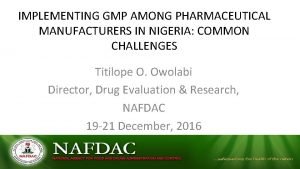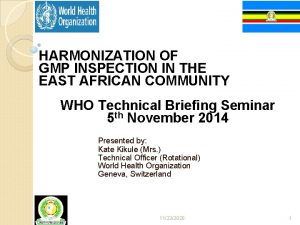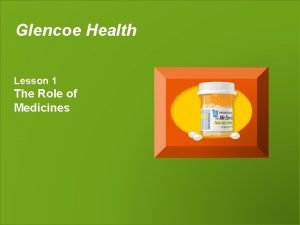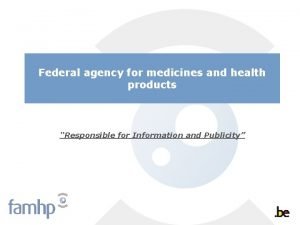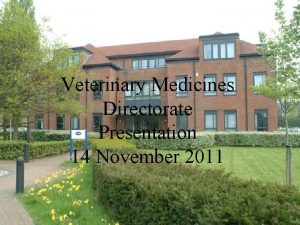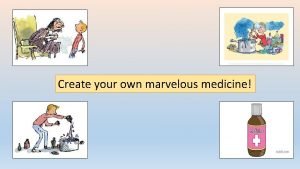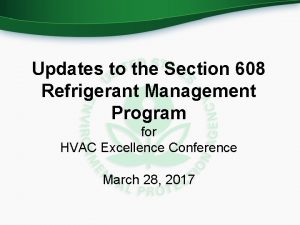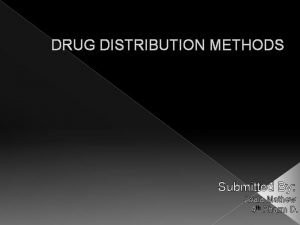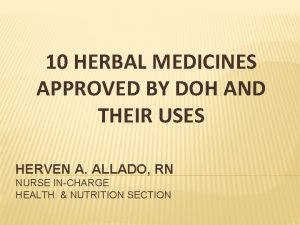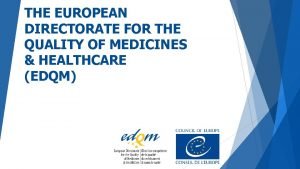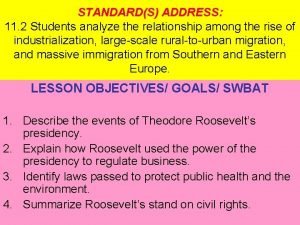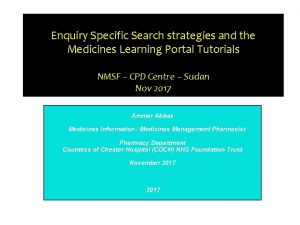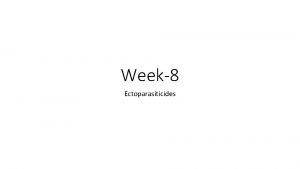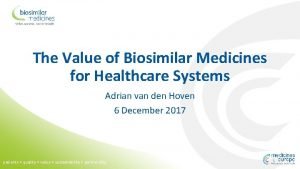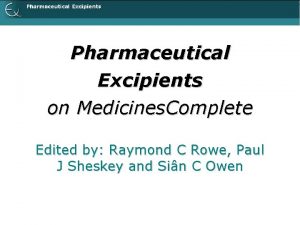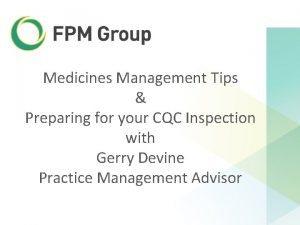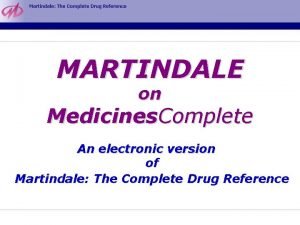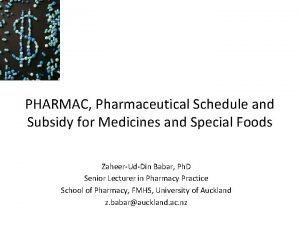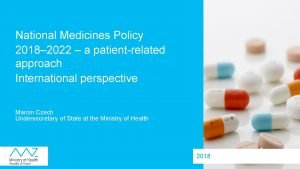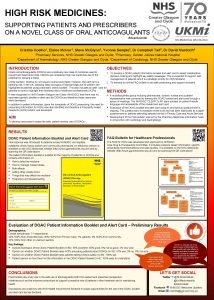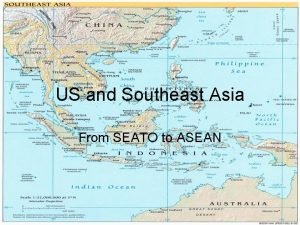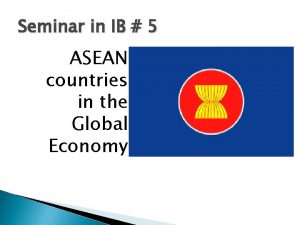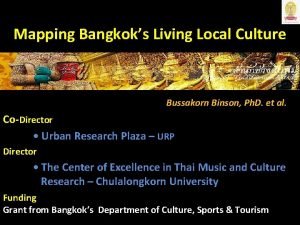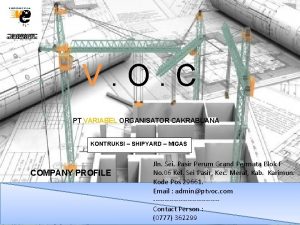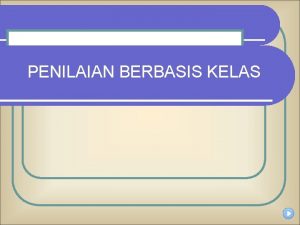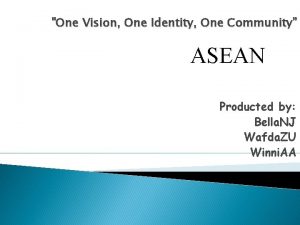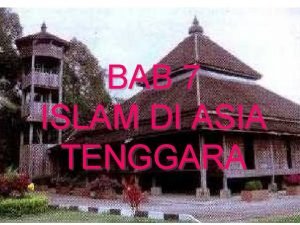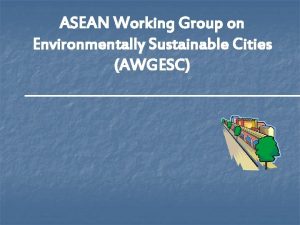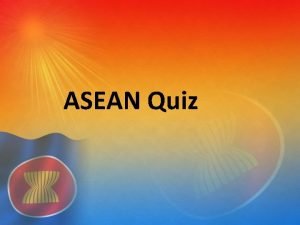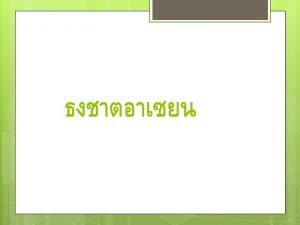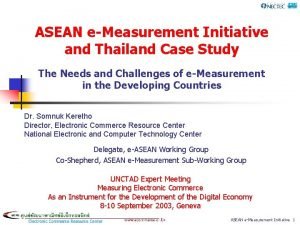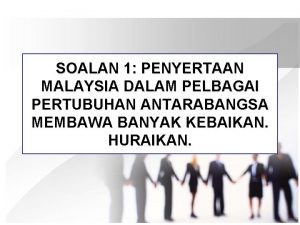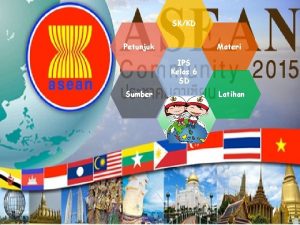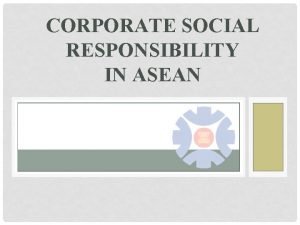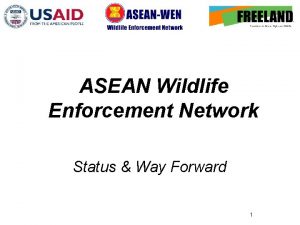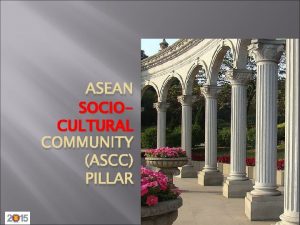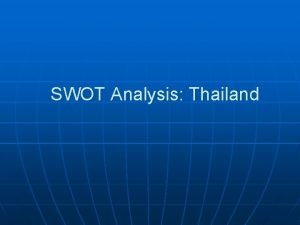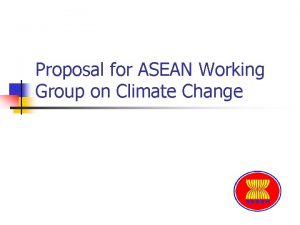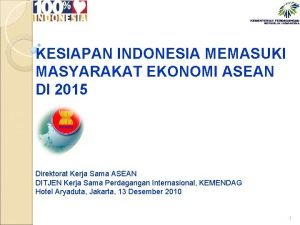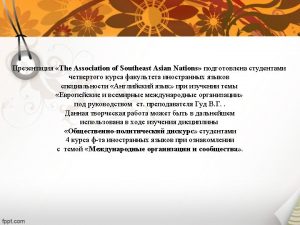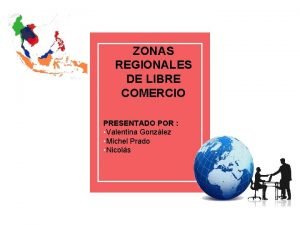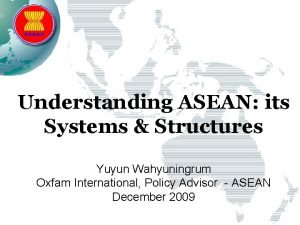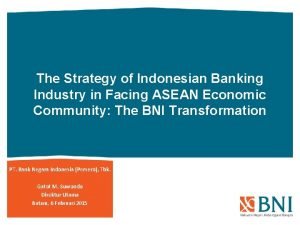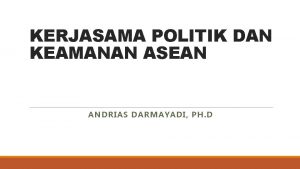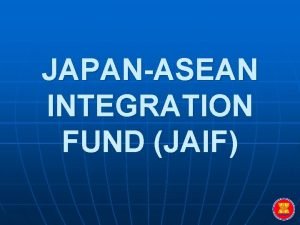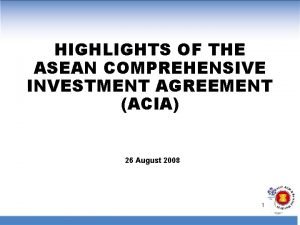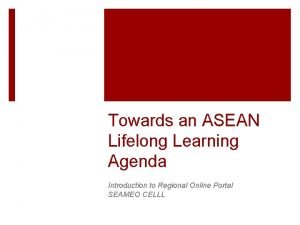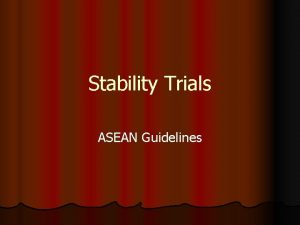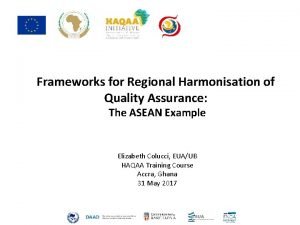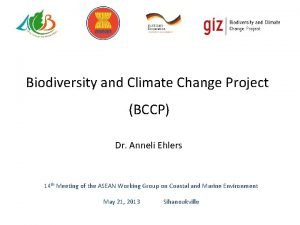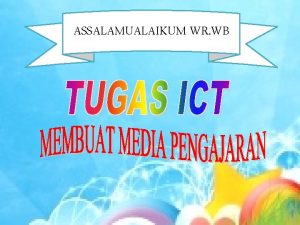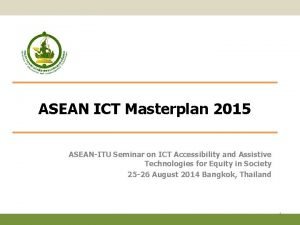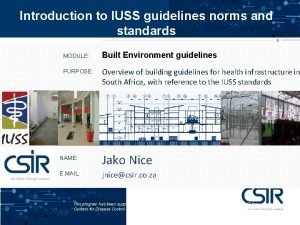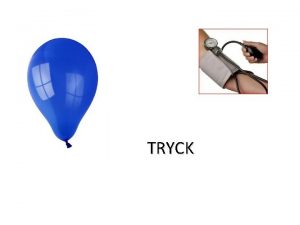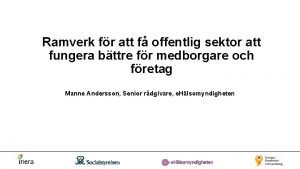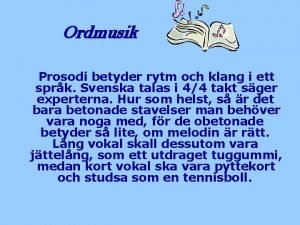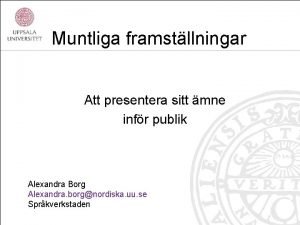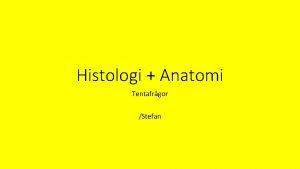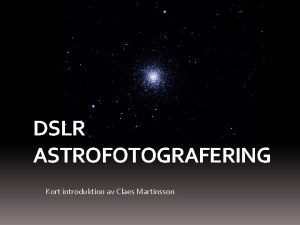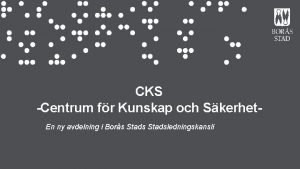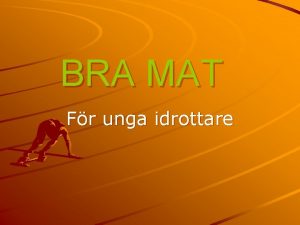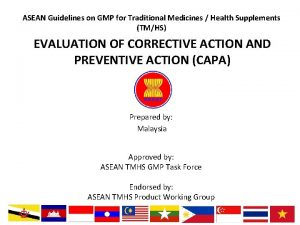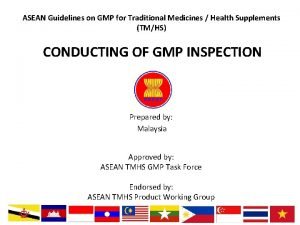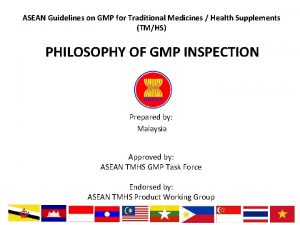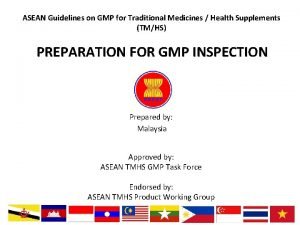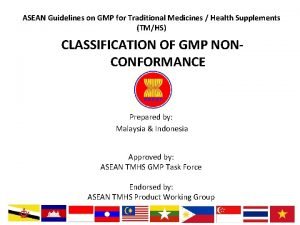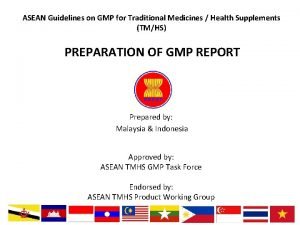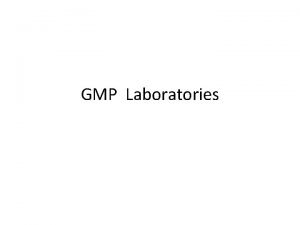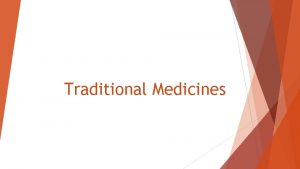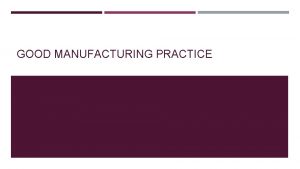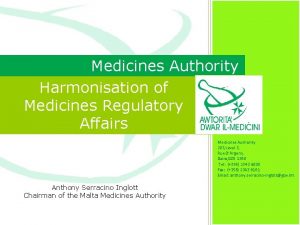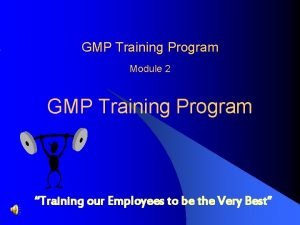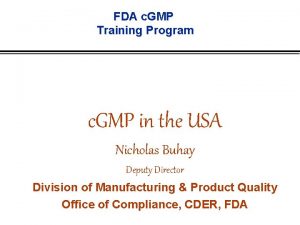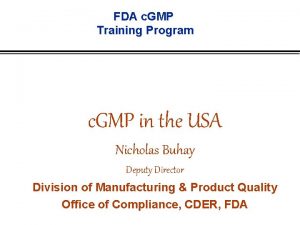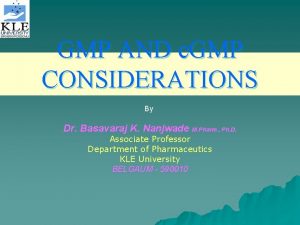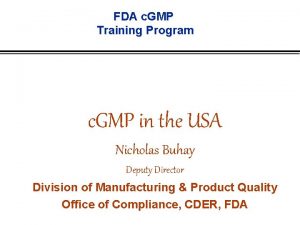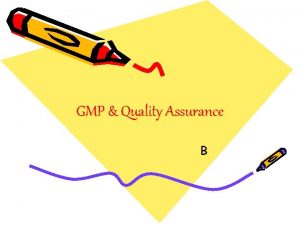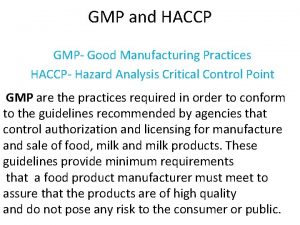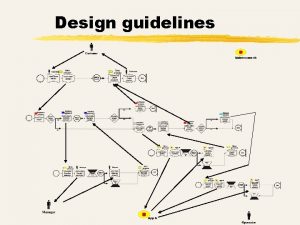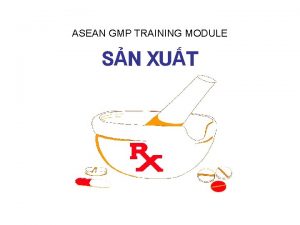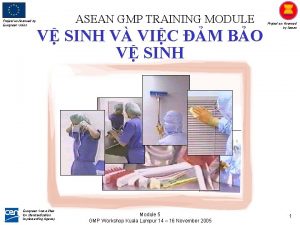ASEAN Guidelines on GMP for Traditional Medicines Health
























































































- Slides: 88

ASEAN Guidelines on GMP for Traditional Medicines / Health Supplements (TM/HS) PHILOSOPHY OF GMP INSPECTION Prepared by: Malaysia Approved by: ASEAN TMHS GMP Task Force Endorsed by: ASEAN TMHS Product Working Group

Legal Terms ü Right to be heard: No person shall be condemned, punished or have any property or legal right compromised by a court of law or authority action without having heard that person. ü Suspensive effective: The postponement of the execution of a decision pending the outcome of an appeal. ASEAN Guidelines on GMP for Traditional Medicines / Health Supplements - 2015 Philosophy of Inspection 2

Legal Terms ü Decision: A judgment, decree, or determination of findings of fact and/or of law by a judge, arbitrator, court, governmental agency, or other official court. ü Advance notice: Informs the addressee about the decision that will be taken to guarantee the addressee’s right to be heard. ASEAN Guidelines on GMP for Traditional Medicines / Health Supplements - 2015 Philosophy of Inspection

Most auditors would be familiar with the following requirements: Audit trails (if applicable) Backup Archiving Disaster Recovery ASEAN Guidelines on GMP for Traditional Medicines / Health Supplements - 2015 Philosophy of Inspection

Where electronic signatures are required, the following must be controlled : ü Authorized user log-on for a specific application ü A unique password called for the CS, linked to the authorized account for a specific application ü Permitted task functionality for that user ü Common time and standard referencing and transaction linking ü Time stamped audit trail ü System information security ASEAN Guidelines on GMP for Traditional Medicines / Health Supplements - 2015 Philosophy of Inspection

Audit trail requirements: ü The system should record the identity of operators entering or confirming critical data. ü Any alteration to an entry of critical data should be authorized and recorded with the reason for the change. ü Consideration should be given to building into the system the creation of a complete record of all entries and amendments (an “audit trail”). ASEAN Guidelines on GMP for Traditional Medicines / Health Supplements - 2015 Philosophy of Inspection

Audit trail requirements: ü Any alteration made to the entry on a document should be signed and dated. ü The alteration should permit the reading of the original information. ü Where appropriate, the reason for the alteration should be recorded. ASEAN Guidelines on GMP for Traditional Medicines / Health Supplements - 2015 Philosophy of Inspection

Audit trail’s function: To independently record: ü the date and time of operator entries ü creations, modifications, or deletions of electronic records ü to verify that record changes do not obscure previously recorded information. ASEAN Guidelines on GMP for Traditional Medicines / Health Supplements - 2015 Philosophy of Inspection

Audit trail must be: Secured System generated Time stamped Immutable ASEAN Guidelines on GMP for Traditional Medicines / Health Supplements - 2015 Philosophy of Inspection

The Attributes of an Inspector Remember that in an AUDITTING…. Unlimited number of possible scenarios ü Is a systematic approach ü Involves interpersonal skills ü Identifies deficiencies ü Look at what went wrong ü Requires participation from both parties ü Good Inspection Skills ASEAN Guidelines on GMP for Traditional Medicines / Health Supplements - 2015 Philosophy of Inspection

The Attributes of an Inspector ü We must respect the codes of ethics and conduct; ü Keep objectivity, impartiality, confidentiality ü Mandatory good diplomat ü Quality System mandatory for all inspectorates ? ASEAN Guidelines on GMP for Traditional Medicines / Health Supplements - 2015 Philosophy of Inspection

The Attributes of an Inspector PI 002 -3 25 September 2007 RECOMMENDATION ON QUALITY SYSTEM REQUIREMENTS FOR PHARMACEUTICAL INSPECTORATES 3. PURPOSE The purpose of adopting a common standard of inspection is to achieve consistency in auditing standards between auditors and thus to Facilitate mutual recognition and confidence between AUDITORS / INSPECTORATES ASEAN Guidelines on GMP for Traditional Medicines / Health Supplements - 2015 Philosophy of Inspection

The Attributes of an Inspector PI 002 -3 25 September 2007 RECOMMENDATION ON QUALITY SYSTEM REQUIREMENTS FOR PHARMACEUTICAL INSPECTORATES The personnel of the auditing service, should be free from any commercial, financial and other pressures which might affect their judgment and freedom to act. Auditor should ensure that the persons or organizations external to the audited organization cannot influence the result of the audit. Rules for deontology, ethics, conflict of interest and improper influence should be clearly defined. ASEAN Guidelines on GMP for Traditional Medicines / Health Supplements - 2015 Philosophy of Inspection

The Attributes of an Inspector PI 002 -3 25 September 2007 RECOMMENDATION ON QUALITY SYSTEM REQUIREMENTS FOR PHARMACEUTICAL INSPECTORATES When more than one auditor is involved in an audit, a lead inspector should be appointed to coordinate audit activities. The audit report should normally be prepared by the lead auditor and should be agreed by all participating auditors. Observations and/or data obtained in the course of the audit should be recorded in a timely manner to prevent loss of relevant information. ASEAN Guidelines on GMP for Traditional Medicines / Health Supplements - 2015 Philosophy of Inspection

The Attributes of an Inspector Technical Aspects The auditor should have the skill to make professional judgments based on Facts and Science as to the conformity of the audited party with the requirements of good practices and the relevant legislation / guidelines and be able to make an appropriate risk assessment. ASEAN Guidelines on GMP for Traditional Medicines / Health Supplements - 2015 Philosophy of Inspection

The Attributes of an Inspector Technical & Non – technical Aspects The credibility of a auditing process will depend to a large degree on the technical competence and integrity of the auditor but The non-technical skills are equally important to the final outcome. ASEAN Guidelines on GMP for Traditional Medicines / Health Supplements - 2015 Philosophy of Inspection

The Attributes of an Inspector Non-technical Aspects Clothing Dress accordingly & Taking in account the country codes Note: Important for women inspectors, given the variability of custom clothing ASEAN Guidelines on GMP for Traditional Medicines / Health Supplements - 2015 Philosophy of Inspection

The Attributes of an Inspector Non-technical Aspects Remember that as an inspector, we are obliged to… ü ü ü ü PREPARE how you will introduce yourself, the interview & its purpose ASSESS already available info SPECIFY interview objective Preparation Flexibility & Set limits Objectivity Positive attitude Integrity Always do your Coherence homework: “Perfect Good Organization Skills Preparation Prevent Poor Performance” ASEAN Guidelines on GMP for Traditional Medicines / Health Supplements - 2015 Philosophy of Inspection

The Attributes of an Inspector Non-technical Aspects Good Communication Skills ü Language ü Body language ü Personality, Emotions, Culture Note: “Personality” as a dynamic and organized set of characteristics possessed by a person that uniquely influences his or her cognitions, motivations, and behaviors in various situations. The word “personality” originates from Latin persona, which means mask. ASEAN Guidelines on GMP for Traditional Medicines / Health Supplements - 2015 Philosophy of Inspection

The Attributes of an Inspector Non-technical Aspects Remember that we are obliged to……. üDefine objectives üSet priorities üDetect weaknesses üDetect inconsistencies üCheck traceability üManage bad conduct & conflicts PLANNING AHEAD Good Time Management Manage people/processes Creating links Manage the situation / process / Manage time ASEAN Guidelines on GMP for Traditional Medicines / Health Supplements - 2015 Philosophy of Inspection

The Attributes of an Inspector Non-technical Aspects An audit process requires participation from both parties – with questions followed by answers that frequently, the response will lead to the next question, so we must be a good listener ASEAN Guidelines on GMP for Traditional Medicines / Health Supplements - 2015 Philosophy of Inspection

The Attributes of an Inspector Non-technical Aspects A positive atmosphere makes inspections much more easier for both parties ASEAN Guidelines on GMP for Traditional Medicines / Health Supplements - 2015 Philosophy of Inspection

The Attributes of an Inspector Non-technical Aspects Asking Questions…. Open questions stating with: üWhat? üWhy? üWhen? ü How? ü Where? ü Who? Good questioning skills Silence can be very powerful ASEAN Guidelines on GMP for Traditional Medicines / Health Supplements - 2015 Philosophy of Inspection

The Attributes of an Inspector Non-technical Aspects “Good listening practices” üActive listening & avoid misunderstanding or üPassive listening and paying attention üHear the person out & be patient üShow the person that you are listening & interested üEncourage the person to continue e. g. by facing the person repeat important information with your own words wait for the confirmation üBe approachable üTry to understand the speaker’s points of view ASEAN Guidelines on GMP for Traditional Medicines / Health Supplements - 2015 Philosophy of Inspection

The Attributes of an Inspector Non-technical Aspects At Meeting Do Not Include: ü Subjective opinions ü Irrelevant information ü Ambiguous statement ü Antagonistic statement ü New deficiencies which are not previously discussed! ü Transparency ASEAN Guidelines on GMP for Traditional Medicines / Health Supplements - 2015 Philosophy of Inspection

The Attributes of an Inspector Non-technical Aspects At Meeting: Good communication & interpersonal skills üInspector must lead üConcise presentation üDiscussion üKnow when to invite discussion and when to limit the discussion üMention good points before deficiencies üTreat challenges politely üDiscuss and resolve conflicts üAdmit if wrong üDon’t back down if convinced you are right ASEAN Guidelines on GMP for Traditional Medicines / Health Supplements - 2015 Philosophy of Inspection

The Attributes of an Inspector Non-technical Aspects Should be aware of the auditor’s influence Careful interfering in “well” coordinated process / systems Avoid entering the role of a consultant ü Tell what is wrong ü Why it is wrong ü But not how to change! ASEAN Guidelines on GMP for Traditional Medicines / Health Supplements - 2015 Philosophy of Inspection

The Attributes of an Inspector Non-technical Aspects Disclosure of faults, deficiencies, discrepancies ü How to say it ü How to find the key to the understanding of the other party Good Interpersonal skills ASEAN Guidelines on GMP for Traditional Medicines / Health Supplements - 2015 Philosophy of Inspection

The Attributes of an Inspector Non-technical Aspects Avoid & Control ü Bad predisposition & Prejudgment ü Underestimate the auditee ü Excessively emotional ü Hubris, Arrogance & Truculence ü Inexperience ü Bad preparation of inspection ü Interest conflicts ü Personal interpretation of guidelines ü Negligence; opportunist; ü Narcissism ASEAN Guidelines on GMP for Traditional Medicines / Health Supplements - 2015 Philosophy of Inspection

Approaching the Interview ü What is the objective or purpose of the inspection? ü What do I know? ü What do I want to know? ü What are the element of the concern? ü What is the background of the company/interviewee? ASEAN Guidelines on GMP for Traditional Medicines / Health Supplements - 2015 Philosophy of Inspection

Skills and Attributes of the Inspector ü Relevant training and knowledge on the requirements and technical processes for the specific inspection. ü Demonstrate the 4 P’s • Polite • Prepared • Professional • Patient ASEAN Guidelines on GMP for Traditional Medicines / Health Supplements - 2015 Philosophy of Inspection

Do’s and Don’ts of Questioning Don’t üIntimidate, interrogate or thick üEmbarrass interviewees üAnswer your own questions üAsk more than one question at a time üAsk too many question with a “yes” or “no” answer üGet sidetracked by answers üSay you understand if you don’t ASEAN Guidelines on GMP for Traditional Medicines / Health Supplements - 2015 Philosophy of Inspection

Do’s and Don’ts of Questioning Do ü Interview and involve the right audience ü Set a theme before posing questions ü Include one main thought in each question ü State questions clearly, concisely and audibly ü Ask questions in a friendly and natural way ü Use questions carefully and time them appropriately ASEAN Guidelines on GMP for Traditional Medicines / Health Supplements - 2015 Philosophy of Inspection

Open-ended Questions ü Require factual, detailed responses by the interviewee. ü Creates a dialog between the inspector and the interviewee and answers are able to indicate whether the interviewee understood the questions. ü Generally, one open-ended question will lead to another through the dialog process. ü Typically begin with : what, why, when, where, who & how ASEAN Guidelines on GMP for Traditional Medicines / Health Supplements - 2015 Philosophy of Inspection

Open-ended Questions Types of open-ended questions include: • Themed questions • Expansive questions • Investigative questions • Opinion questions • Repetitive questions • Hypothetical questions ASEAN Guidelines on GMP for Traditional Medicines / Health Supplements - 2015 Philosophy of Inspection

Remember to… ü Put interviewee at ease prior to the interview ü Be tactful and polite ü Reflect the right attitude and tone of voice ü Use paraphrasing where necessary ü Watch body language and facial expressions ü Smile and show eye contact ü Listen actively and show interest in the interviewee ü Show patience and understanding ü Turn off your own problems ü Avoid off-the-cuff or condescending remarks ü Give praise when appropriate ü Say please and thank you ASEAN Guidelines on GMP for Traditional Medicines / Health Supplements - 2015 Philosophy of Inspection

Types of Open-ended Questions ü Themed questions: requires setting a theme before posing a question, e. g. : “Talking of software validation, how do you…? ” ü Expansive questions: expands the conversation and also creates a high level of empathy because they show that the inspector is interested in interviewee’s responses. Can often clear up vague areas as well as clarify the inspector’s perceptions, e. g. : “How important is it for you to be advised of this type of procedure? ”; “What areas are you thinking of? ”; “Why do you feel there is a need for …? ” ASEAN Guidelines on GMP for Traditional Medicines / Health Supplements - 2015 Philosophy of Inspection

Types of Open-ended Questions ü Investigative questions: have an investigative role and also useful when the inspector is not sure whether the interviewee has fully understood a question but avoids making it obvious, e. g. : “Can you tell me why this unit marked with a red tag is on the pallet of finished goods tested? ” ü Opinion question: useful for gaining someone’s attention and confidence or for gaining new approaches to solving a problem. Also indicates that the inspector regards the interviewee view as important and encourages them to say more, e. g. : “What do you think would be the most effective…? ; “How would you go about …? ” ASEAN Guidelines on GMP for Traditional Medicines / Health Supplements - 2015 Philosophy of Inspection

Types of Open-ended Questions ü Repetitive questions: questions that may need to be repeated or paraphrased for the purpose of eliciting more information but overuse of repetitive questions should be avoid. ü Hypothetical questions: should also be used with care but can be a good way of gauging priorities and contingency planning. e. g. : “Suppose the power failed? ”, “What if no calculations satisfied this equation? ” ASEAN Guidelines on GMP for Traditional Medicines / Health Supplements - 2015 Philosophy of Inspection

Types of Open-ended Questions ü Probing questions: Having stimulated the interviewee to talk, the inspector may wish to pursue a particular point further. Probing questions allow a focus on a point of interest and yield more information. Usually also contain: what, why, when, where, who & how. e. g. : “Tell me more about how…? ” ASEAN Guidelines on GMP for Traditional Medicines / Health Supplements - 2015 Philosophy of Inspection

Closed Questions ü Require a simple “yes” or “no” from the interviewee. ü It does not allow you to judge if the question was fully understood. ü Does not promote a dialog and requires that the inspector follow up with further questions. ü Forces the auditor to do all of the work. ü Types of closed questions include: • Assumptive questions • Leading questions • Loaded questions ASEAN Guidelines on GMP for Traditional Medicines / Health Supplements - 2015 Philosophy of Inspection

Types of Closed Questions ü Assumptive Questions: these questions are formulated based on assumptions and directed in such a way that a straight answer needs the person answering to adhere to the inspector’s assumption. E. g. , “How often do you do that? ” (assumes that it’s done at least sometimes) ü Leading Questions: These questions point the interviewee in the direction of the answer and are best avoided. The may be of use sometimes to secure the commitment of the interviewee to a preferred line of action. E. g. , “So you will go ahead with this corrective action and report back within two weeks? ” In this way, the inspector leads the question to an obvious answer but may also get the commitment of the interviewee to take the corrective action. ASEAN Guidelines on GMP for Traditional Medicines / Health Supplements - 2015 Philosophy of Inspection

Types of Closed Questions ü Loaded Questions: this type of question puts the interviewee in a losing situation. For example: “Have you stopped deviating from GMP? ” if the answer is ‘yes’, the person is obviously a GMP violator, although a reformed one. If the answer is ‘no’ then the person is an uninformed GMP violator. There is no answer for a responsible person who does comply with GMP. ASEAN Guidelines on GMP for Traditional Medicines / Health Supplements - 2015 Philosophy of Inspection

Combination Questions ü Also called Clarifying Questions: are a combination of open and close questions and may be used to obtain more information on a specific subject, or to eliminate ambiguity. These questions can also be reassuring to the interviewee as it demonstrates that the inspector has been listening carefully and observing what has been said accurately. E. g. : “Can you explain what you mean by that? ” ASEAN Guidelines on GMP for Traditional Medicines / Health Supplements - 2015 Philosophy of Inspection

Non-Verbal Techniques ü Silence: This is the secret weapon in the inspector’s armory as most people are very uncomfortable with silence. If the response to an open-ended question leaves the inspector with a strong impression that there is more to come, it is worth remaining silent for a while. Almost invariably the interviewee becomes uncomfortable and start talking again. This technique has to be handled with care and used only when the inspector is fairly confident that there is more information to come or it may create insecurity and anxiety on the part of the interviewee. ASEAN Guidelines on GMP for Traditional Medicines / Health Supplements - 2015 Philosophy of Inspection

Non-Verbal Techniques ü Non-verbal questioning: For example, raising of the eyebrows while maintaining eye contact can indicate a wish for the interviewee to continue with his response or to confirm what has been said. Also, simply looking at the interviewee in an expectant manner following a response often encourages him to carry on talking without verbal interruption. Such a technique must be used with care to avoid the appearance of an interrogation. ASEAN Guidelines on GMP for Traditional Medicines / Health Supplements - 2015 Philosophy of Inspection

Non-Verbal Techniques ü Tone and Emphasis: Often a different meaning can be conveyed by a question simply by altering the tone and emphasis of its delivery. E. g. , “Who authorized THAT? ” – a simple request for information. It can become: “Who authorized THAT? ” – meaning who in their right mind would authorize that load of rubbish? Or: “WHO authorized that? ” – meaning (s)he hasn’t the authority to do that. Or even: “WHO authorized THAT? ” ASEAN Guidelines on GMP for Traditional Medicines / Health Supplements - 2015 Philosophy of Inspection

PHILOSOPHY OF GMP INSPECTION POWER & INFLUENCING STYLES, HANDLING DIFFICULT BEHAVIOR, ELICITING OPTIMAL RESPONSES ASEAN Guidelines on GMP for Traditional Medicines / Health Supplements - 2015 Philosophy of Inspection

Power & Influencing Styles ü You are in control of the inspection not the organisation. ü How do you demonstrate this? ü Walk of Grace and Power: • From the car to Reception • From Reception to the Meeting Room • Entering the Meeting Room ASEAN Guidelines on GMP for Traditional Medicines / Health Supplements - 2015 Philosophy of Inspection

Power & Influencing Styles ü You are in control of the auditing not the company. ü Speak at 100 words per minute. This will recognized sub -consciously that you are delivering a serious message. ü State clearly at the beginning that any company presentations must be short and directly relevant to the inspection. ü Be prepared to interrupt politely if the company tries to waste time with irrelevant company history or sales figures. ASEAN Guidelines on GMP for Traditional Medicines / Health Supplements - 2015 Philosophy of Inspection

Power & Influencing Styles ü You have to take control of the Introductory meeting immediately. ü In the Meeting Room, sit in the chair with Grace and Power. ü Prepare your bag carefully so that you can arrange you papers smoothly and confidently (No digging around trying to find stuff!). ü If using laptop, make sure that the battery is fully charged. There is nothing more undignified than scrambling around the floor under the table looking for a power socket. ASEAN Guidelines on GMP for Traditional Medicines / Health Supplements - 2015 Philosophy of Inspection

The Easy Way (of course!) ü The first step is to build rapport with the staff you are talking to. ü The first step is to arrange the Inspector’s room to make it as comfortable and relaxed as possible: • • Ensure that the seat next to you is empty so that when staff come in to explain documents, procedures, etc. they can sit next to you. Keep the table free of excessive clutter, papers, coffee mugs, etc. but not sterile. ASEAN Guidelines on GMP for Traditional Medicines / Health Supplements - 2015 Philosophy of Inspection

What is the purpose of inspection & How do you achieve it? ü To convert Data to Information to Knowledge about the company, the products and the processes. ü Most companies collect boxes or gigabytes of data but do little to convert it. ü The Inspector can do this conversion the easy way or the difficult way. ASEAN Guidelines on GMP for Traditional Medicines / Health Supplements - 2015 Philosophy of Inspection

The Easy Way (of course!) ü YOU need to change your behavior now: • • • Sit in the relaxed way in your chair – not as per the Introductory Session where you are sitting with Grace and Power. Remember: You have to continually invite them to talk. You do this by using your listening skills. ASEAN Guidelines on GMP for Traditional Medicines / Health Supplements - 2015 Philosophy of Inspection

The Easy Way (of course!) ü Greet them nicely when they enter the room and invite them to sit next to you. ü Next, you put them at ease by some small talk. ü It is important to remember that YOU have to invite the person to talk. They will usually have been instructed to strictly only answer your questions and not to talk. ü You need to get them relaxed in as short time as possible and chatting. ASEAN Guidelines on GMP for Traditional Medicines / Health Supplements - 2015 Philosophy of Inspection

Listening Skills ü Focus the person’s train of thought, not on what your next question is going to be ü If there is a gap in the response don’t rush in and ask another question – the person might just be thinking or trying to rephrase their answer – be patient ü When listening to an answer try to maintain some eye contact ASEAN Guidelines on GMP for Traditional Medicines / Health Supplements - 2015 Philosophy of Inspection

Listening Skills ü Look at them when listening ü Its OK to take brief notes/key word whilst listening but not complete sentences under normal circumstances. More detailed notes can be written after the person has finished speaking if need be. ü Show that you are listening, a nod of the head, mmm, I see. It does not mean that you agree with what they are saying just that you hear what they are saying. ASEAN Guidelines on GMP for Traditional Medicines / Health Supplements - 2015 Philosophy of Inspection

Listening Skills ü Active listening – interested in hearing and understanding and actively confirms that the message is being understood both during and after the answer. Repeat the words that they use. • Probably the most effective type of listening under most circumstances. ASEAN Guidelines on GMP for Traditional Medicines / Health Supplements - 2015 Philosophy of Inspection

Listening Skills ü Passive listening – interested in hearing and understanding but fails to verify the answer, e. g. by paraphrasing or by not providing feedback “I see, mmm” ASEAN Guidelines on GMP for Traditional Medicines / Health Supplements - 2015 Philosophy of Inspection

Communication Preferences Most of us have a preferred way of communicating: ü Audio (hearing) • I hear what you say ü Visual (seeing) • I see what you mean ü Kinaesthetic (feeling) • I feel that you are right ASEAN Guidelines on GMP for Traditional Medicines / Health Supplements - 2015 Philosophy of Inspection

Communication The best piece of advice I was given was “Remain in the here and now” when asking questions and listening to the answers. It’s all too easy to let the mind wander and think about other things. The second best piece of advice I was given was: If you are getting good clear answers to your questions, you are asking the wrong questions! ASEAN Guidelines on GMP for Traditional Medicines / Health Supplements - 2015 Philosophy of Inspection

Communication ü Listen for the cues that will help you determine the optimum way to communicate. ü If you are not being understood try: • • • For the audio person – “let me put it another way” For the visual person – “let me show you what I mean” For the kinaesthetic person – “ If your feel like that then perhaps I can explain it this way” ASEAN Guidelines on GMP for Traditional Medicines / Health Supplements - 2015 Philosophy of Inspection

Difficult Behavior ü By establishing Rapport immediately and by using your communication skills then this will usually prevent problems right at the beginning. ü Other difficult behaviors: • • Aggressive personality: tries to dominate / browbeat the inspector. Competitive personality: tries to show clever they are. ASEAN Guidelines on GMP for Traditional Medicines / Health Supplements - 2015 Philosophy of Inspection

Difficult Behavior ü Prevention is better than cure. ü What causes difficult behavior? • • • Nervous Worried Blame culture ASEAN Guidelines on GMP for Traditional Medicines / Health Supplements - 2015 Philosophy of Inspection

Difficult Behavior: Anger ü You must behave like this every time the other person starts. Starts as you mean to go on. Example : • Unannounced inspection; • Complaints from other companies; • Managing Director angry & aggressive from start; • “Have you ever performed an inspection? ” • “I will tell you what the situation is!” • ASEAN Guidelines on GMP for Traditional Medicines / Health Supplements - 2015 Philosophy of Inspection

Difficult Behavior: Anger ü Always try to avoid responding to anger by anger. It only makes things worse. ü Take a deep breathe to keep calm. ü Try to identify the emotion that the other’s anger elicits in you and express it calmly and firmly, using the first person singular. “I don’t like it when you speak to me like that” ASEAN Guidelines on GMP for Traditional Medicines / Health Supplements - 2015 Philosophy of Inspection

Difficult Behavior: Anger • I had my Agenda, MD had completely different Agenda. • 30 min verbal fight. • Time for new strategy: “Establish Rapport: “Tell me about that”, “Why do you think that”, “That’s an interesting point, tell me more”. Just listened for 30 min and did not challenge or discuss. Used “Clean Questioning Tool”. ASEAN Guidelines on GMP for Traditional Medicines / Health Supplements - 2015 Philosophy of Inspection

Difficult Behavior: Anger ü “Don’t you ask questions just let me speak” ü “You are completely wrong: Admit it!” ü “I am going to complain to my MP” So what went wrong? • No opportunity to establish Rapport at the beginning. • Ambience not conducive. ASEAN Guidelines on GMP for Traditional Medicines / Health Supplements - 2015 Philosophy of Inspection

Difficult Behavior: Anger ü LESSON LEARNT: • I needed to control the inspection from the start. • The MD was determined to control the inspection. • The initial fight was necessary in this case but I let it go on for too long (30 min). • I should have begun to establish Rapport after 10 min. ASEAN Guidelines on GMP for Traditional Medicines / Health Supplements - 2015 Philosophy of Inspection

Difficult Behavior: Anger ü Anger gradually dissolved ü Rapport established ü Now time for my Agenda! ü Gradual acceptance that I too had a legitimate point and that the company needed to change ü Result: Company will comply. ASEAN Guidelines on GMP for Traditional Medicines / Health Supplements - 2015 Philosophy of Inspection

Difficult Behavior: Frustration ü You (the inspector) just don’t get it! e. g. : You have failed to understand what I have said. ü This is all too common when inspecting a complex issue e. g. : OOS or Deviation Reports ü To avoid getting into this situation use the “Paraphrase” tool. ASEAN Guidelines on GMP for Traditional Medicines / Health Supplements - 2015 Philosophy of Inspection

The Paraphrase Tool ü Paraphrase question: “From what you have told me, whilst the SOP was followed exactly and there is an audit trail, and incorrect dosing regime was administered, is my understanding correct? ” • Use to confirm that you have understood what the person has told you • Helps avoid misunderstandings and can save a lot of time • The paraphrase question is a very powerful tool and much underused. ASEAN Guidelines on GMP for Traditional Medicines / Health Supplements - 2015 Philosophy of Inspection

Clean Question Tool ü Clean questions – always start with “And” • And after you have entered the data what happens next? • And after that? • And then what happens? • And is there anything else? • And where does this information come from? ü Clean questions lack emotional content and are best used if the person is getting upset ASEAN Guidelines on GMP for Traditional Medicines / Health Supplements - 2015 Philosophy of Inspection

Inspector Behavior ü Occasionally we all make the mistake of implied criticism of the individual and not the system. ü This is usually down to poor use of words or using inappropriately phrased questions. ü Can result in tears, anger, resentment and sullenness. ü The situation can be recovered by using the “Clean Question” tool. ASEAN Guidelines on GMP for Traditional Medicines / Health Supplements - 2015 Philosophy of Inspection

The Hard Way As I said earlier there is an easy way and a hard way of achieving the objective of the inspection: To convert Data to Information to Knowledge we have looked at the easy way of doing this by getting the company to do it for you. Now let us look at an Inspector who does it the hard way… ASEAN Guidelines on GMP for Traditional Medicines / Health Supplements - 2015 Philosophy of Inspection

The Reflective Question Tool ü Occasionally you may come across the situation where somebody is very upset over a mistake that has happened and you need to recover the situation. ü Reflective question: “So, you feel upset that even though you followed the SOP this error was made? ” – Repeating back the emotional content of a person’s statement is very powerful tool for creating empathy and handling emotionally charged situations. ASEAN Guidelines on GMP for Traditional Medicines / Health Supplements - 2015 Philosophy of Inspection

The Hard Way ü Whilst this is an extreme picture, I have observed these behaviors. ü Whilst we as inspectors need to use these traits sometimes, we need to be aware that soft skills usually get the results much quicker and easier than hard analytical skills. ü As the Gold Sheet once said – beware of the Inspector who gets you staff to talk! ASEAN Guidelines on GMP for Traditional Medicines / Health Supplements - 2015 Philosophy of Inspection

The Hard Way Characteristics of this inspector: ü Happiest with raw data ü Number crunching and data entry into customised spreadsheets a speciality ü Does not see people only data ü Can spend hours observing a process ü Fascinated by minutes: has trouble seeing the big picture ASEAN Guidelines on GMP for Traditional Medicines / Health Supplements - 2015 Philosophy of Inspection

8 Core Beliefs of Extraordinary Bosses ASEAN Guidelines on GMP for Traditional Medicines / Health Supplements - 2015 Philosophy of Inspection

Business Is An Ecosystem, Not A Battlefield Average bosses see business as a conflict between companies, departments and group. They build huge armies of “troops” to order about, demonize competitors as “enemies, ” and treat customers as “territory” to be conquered. Extraordinary bosses see business as a symbiosis where the most diverse firm is most likely to survive and thrive. They naturally create teams that adapt easily to new markets and can quickly form partnerships with other companies, customers … and even competitors. ASEAN Guidelines on GMP for Traditional Medicines / Health Supplements - 2015 Philosophy of Inspection

A Company Is A Community, Not A Machine Average bosses consider their company to be a machine with employees as cogs. They create rigid structure with rigid rules and then try to maintain control by “pulling levers” and “steering the ship. ” Extraordinary bosses see their company as a collection of individual hopes and dreams, all connected to a higher purpose. They inspire employees to dedicate themselves to the success of their peers and therefore to the community-and company-at large. ASEAN Guidelines on GMP for Traditional Medicines / Health Supplements - 2015 Philosophy of Inspection

Management Is Service, Not Control Average bosses want employees to do exactly what they’re told. They’re hyper-aware of anything that smacks of insubordination and create environments where individual initiative is squelched by the “wait and see what the boss says” mentality. Extraordinary bosses set a general direction and then commit themselves to obtaining the resources that their employees need to get the job done. They push decision making downward, allowing teams form their own rules and intervening only in emergencies. ASEAN Guidelines on GMP for Traditional Medicines / Health Supplements - 2015 Philosophy of Inspection

My Employees Are My Peers, Not My Children Average bosses see employees as inferior, immature beings who simply can’t be trusted if not overseen by a patriarchal management. Employees take their cues from the attitude, expend energy on looking busy and covering their behinds. Extraordinary bosses treat every employees as if he or she were the most important person in the firm. Excellence is expected everywhere, from the loading dock to the boardroom. As a result, employees at all levels take charge of their own destinies. ASEAN Guidelines on GMP for Traditional Medicines / Health Supplements - 2015 Philosophy of Inspection

Motivation Comes From Vision, Not From Fear Average bosses see fear--of getting fired, of ridicule, of loss of privilege--as a crucial way to motivate people. As a result, employees and managers alike become paralyzed and unable to make risky decisions. Extraordinary bosses inspire people to see a better future and how they’ll be a part of it. As a result, employees work harder because they believe in the organization’s goals, truly enjoy what they’re doing and (of course) know they’ll share in the rewards. ASEAN Guidelines on GMP for Traditional Medicines / Health Supplements - 2015 Philosophy of Inspection

Change Equals Growth, Not Pain Average bosses see change as both complicated and threatening, something to be endured only when a form is in desperate shape. They subconsciously torpedo change … until it’s too late. Extraordinary bosses see change as an inevitable part of life. While they don’t value change for its own sake, they know that success is only possible if employees and organization embrace new ideas and new ways of doing business. ASEAN Guidelines on GMP for Traditional Medicines / Health Supplements - 2015 Philosophy of Inspection

Technology Offers Empowerment, Not Automation Average bosses adhere to the old IT-centric view that technology is primarily a way to strengthen management control and increase predictability. They install centralized computer systems that dehumanize and antagonize employees. Extraordinary bosses see technology as a way to free human beings to be creative and to build better relationships. They adapt their back-office systems to the tools, like smartphones and tablets, that people actually want to use. ASEAN Guidelines on GMP for Traditional Medicines / Health Supplements - 2015 Philosophy of Inspection

Work Should Be Fun, Not Mere Toil Average bosses buy into the notion that work is, at best, a necessary evil. They fully expect employees to resent having to work, and therefore tend to subconsciously define themselves as oppressors and their employees as victims. Everyone then behaves accordingly. Extraordinary bosses see work as something that should be inherently enjoyable-and believe therefore that the most important job of manager is, as far as possible, to put people in jobs that can and will make them truly happy. ASEAN Guidelines on GMP for Traditional Medicines / Health Supplements - 2015 Philosophy of Inspection

ASEAN Guidelines on GMP for Traditional Medicines / Health Supplements - 2015 Philosophy of Inspection 88
 Nafdac gmp guidelines
Nafdac gmp guidelines Gmp
Gmp Chapter 19 lesson 1 the role of medicines
Chapter 19 lesson 1 the role of medicines Federal agency for medicines and health products
Federal agency for medicines and health products Veterinary medicines directorate
Veterinary medicines directorate Staff of marvelous medicines
Staff of marvelous medicines Refrigerant management program
Refrigerant management program Cudd and dudd is the part of drug disribution system for..
Cudd and dudd is the part of drug disribution system for.. Tsaang gubat uses and benefits
Tsaang gubat uses and benefits European directorate for the quality of medicines
European directorate for the quality of medicines What was significant about the way the 1902 coal strike
What was significant about the way the 1902 coal strike Nhs dictionary of medicines and devices
Nhs dictionary of medicines and devices Stockley’s drug interaction
Stockley’s drug interaction Ectoparasiticides veterinary medicines
Ectoparasiticides veterinary medicines Abasagar
Abasagar Medicines complete
Medicines complete Cqc medicines management
Cqc medicines management Medicines information centre
Medicines information centre Medicinescomplete martindale
Medicinescomplete martindale Pharmac schedule
Pharmac schedule National medicines policy
National medicines policy Ggc medicines
Ggc medicines Seato and asean
Seato and asean 3 pillars of asean
3 pillars of asean The three pillars of asean
The three pillars of asean Asean culture
Asean culture Pengertian organisator
Pengertian organisator Kepanjangan asean
Kepanjangan asean Asean one vision
Asean one vision Peta konsep ekonomi
Peta konsep ekonomi Awgesc
Awgesc What is the correct motto of asean? *
What is the correct motto of asean? * Asean symbol meaning
Asean symbol meaning E-asean
E-asean Kebaikan malaysia menyertai pertubuhan antarabangsa
Kebaikan malaysia menyertai pertubuhan antarabangsa Negara laos beribukota di
Negara laos beribukota di Asean countries
Asean countries Awen
Awen Asean wildlife enforcement network
Asean wildlife enforcement network Asean socio-cultural community pillar
Asean socio-cultural community pillar Swot analysis thailand
Swot analysis thailand Awgcc
Awgcc Asean secretariat
Asean secretariat Asean countries
Asean countries Asean ventajas y desventajas
Asean ventajas y desventajas Swot analysis of asean organizational structure
Swot analysis of asean organizational structure Asean banking integration framework
Asean banking integration framework Asean graduate program
Asean graduate program Asean one vision one identity one community
Asean one vision one identity one community Andrias darmayadi
Andrias darmayadi Asean background
Asean background Acia asean
Acia asean Asean centre for biodiversity
Asean centre for biodiversity Asean stability guideline
Asean stability guideline One vision one identity one community
One vision one identity one community Bilateral adalah
Bilateral adalah Asean quality assurance framework
Asean quality assurance framework Asean centre for biodiversity
Asean centre for biodiversity Negara pemrakarsa berdirinya asean
Negara pemrakarsa berdirinya asean Asean ict masterplan 2015
Asean ict masterplan 2015 Iuss online
Iuss online Iso 22301 utbildning
Iso 22301 utbildning Novell typiska drag
Novell typiska drag Tack för att ni lyssnade bild
Tack för att ni lyssnade bild Vad står k.r.å.k.a.n för
Vad står k.r.å.k.a.n för Varför kallas perioden 1918-1939 för mellankrigstiden
Varför kallas perioden 1918-1939 för mellankrigstiden En lathund för arbete med kontinuitetshantering
En lathund för arbete med kontinuitetshantering Underlag för särskild löneskatt på pensionskostnader
Underlag för särskild löneskatt på pensionskostnader Vilotidsbok
Vilotidsbok Sura för anatom
Sura för anatom Densitet vatten
Densitet vatten Datorkunskap för nybörjare
Datorkunskap för nybörjare Stig kerman
Stig kerman Debatt artikel mall
Debatt artikel mall Autokratiskt ledarskap
Autokratiskt ledarskap Nyckelkompetenser för livslångt lärande
Nyckelkompetenser för livslångt lärande Påbyggnader för flakfordon
Påbyggnader för flakfordon Tryck formel
Tryck formel Svenskt ramverk för digital samverkan
Svenskt ramverk för digital samverkan Kyssande vind analys
Kyssande vind analys Presentera för publik crossboss
Presentera för publik crossboss Teckenspråk minoritetsspråk argument
Teckenspråk minoritetsspråk argument Vem räknas som jude
Vem räknas som jude Treserva lathund
Treserva lathund Luftstrupen för medicinare
Luftstrupen för medicinare Bästa kameran för astrofoto
Bästa kameran för astrofoto Cks
Cks Verifikationsplan
Verifikationsplan Mat för unga idrottare
Mat för unga idrottare
